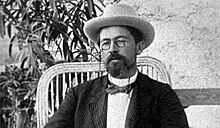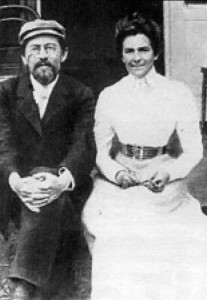- Born on January 29, 1860 in Taganrog, Russia.
- Died (of tuberculosis) on July 15, 1904 in Germany (Aged 44)
- Practiced as a medical doctor throughout his writing career: “Medicine is my lawful wife and literature is my mistress.”
- One of the originators of early modernism in the theater and his stores emphasize the depth of the human experience
CHILDHOOD

 The third of six children, Chekhov was born unto a struggling grocer living on a southern sea port in Russia. An ultra-Orthodox Christian and physically abusive, Pavel–Chekhov’s father–modeled the hypocritical nature of man that Chekhov wrote about. He described his childhood as “suffering” and later became an atheist. He had to bail his family out of financial collapse, and moved his family to Moscow, while he continued studying in Taganrog. He joined them in 1879 to enroll in medical school in Moscow, where he continued to financially support his family through freelance writing, catching and selling goldfinches, and private tutoring.
The third of six children, Chekhov was born unto a struggling grocer living on a southern sea port in Russia. An ultra-Orthodox Christian and physically abusive, Pavel–Chekhov’s father–modeled the hypocritical nature of man that Chekhov wrote about. He described his childhood as “suffering” and later became an atheist. He had to bail his family out of financial collapse, and moved his family to Moscow, while he continued studying in Taganrog. He joined them in 1879 to enroll in medical school in Moscow, where he continued to financially support his family through freelance writing, catching and selling goldfinches, and private tutoring.
BIBLIOGRAPHY (in order of publication)
- Plays (those in bold are considered his classics)
- That Worthless Fellow Platonov
- On the Harmful Effects of Tobacco
- Swansong

- Ivanov (maybe not a classic, but created Chekhov’s “gun rule”)
- The Bear
- A Marriage Proposal
- A Tragedian in Spite of Himself
- The Wedding
- The Wood Demon
- The Festivities
- The Seagull
- Uncle Vanya
- Three Sisters
- The Cherry Orchard
- Short Stories (those in bold are the stories we have covered)
- “The Death of a Government Clerk“
- “The Chameleon”
- “Oysters”
- “A Living Chronology”
- “Small Fry”
- “The Huntsman“
- “A Malefactor”

- “Seargeant Prishibeyev”
- “A Gentleman Friend”
- “At the Mill”
- “Agafya”
- “Anyuta”
- “Easter Eve”
- “Grisha”
- “Misery”
- “The Chorus Girl”
- “Ivan Matveyich”
- “The Requiem”
- “Van’ka”
- “Home”
- “The Siren”
- “Kashtanka”
- “Sleepy”
- “The Bet”
- “A Dreary Story”
- “Gusev”
- “Peasant Wives”
- “The Grasshopper”

- “In Exile”
- “Ward No. 6”
- “The Black Monk”
- “Rothschild’s Violin”
- “The Student“
- “The Teacher of Literature”
- “Anna on the Neck”
- “Whitebrow”
- “Ariadna”
- “An Artist’s Story”
- “Peasants”
- “The Petchenyeg”
- “The Schoolmistress”
- “The Little Trilogy”
- “The Man in a Case“
- “Gooseberries“
- “About Love”
- “Ionych”
- “A Doctor’s Visit”
- “The Darling”
- “On Official Duty”
- “The Lady with the Dog”
- “At Christmas Time”
- “In the Ravine”
- “The Bishop”
- “Betrothed”
- NovellasThe Steppe
- The Duel
- An Anonymous Story
- Three Years
- My Life
LATER LIFE AND DEATH

Tired from relentless writing and fading health, Chekhov went to Ukraine–and found influence to create The Steppe. He was then asked to create a play–Ivanov–and from that play Chekhov’s rule of theater was discovered:
“Remove everything that has no relevance to the story. If you say in the first chapter that there is a rifle hanging on the wall, in the second or third chapter it absolutely must go off. If it’s not going to be fired, it shouldn’t be hanging there.”
Chekhov soon after became obsessed with prison reform and traveled to Sakhalin, an island north of Japan. He came to the conclusion that it is the government’s responsibility to humanely treat convicts.
Chekhov then moved to Melikhovo after purchasing a small country estate, and then ultimately moves again to Yalta after his father’s death. He married an actress–Olga Knipper–in 1901, but at that point the tuburculosis that Chekhov had had since his youth was seriously affecting his health. He died in 1904, while staying at a health resort in Germany. His death has since become a piece of literary history, as many have fictionalized it and used it as inspiration for their own writing, most famously by Raymond Carver in his short story “Errand”.
Chekhov’s plays are still staged, his works still read. He is one of the greatest writers of his time and his tremendous body of work shaped the arc of literature and still does.
